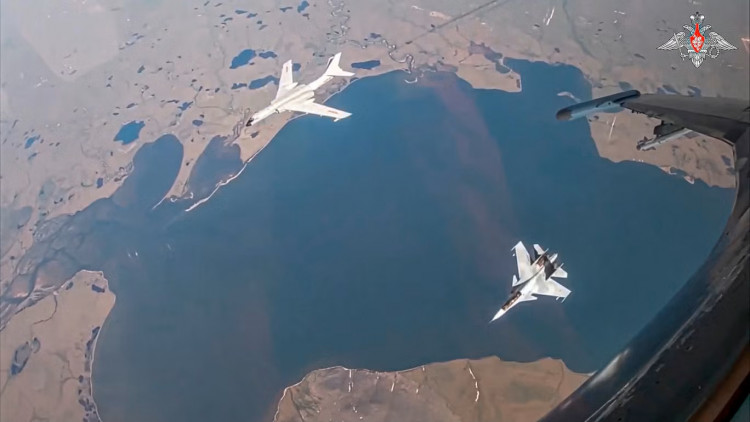The U.S. military intercepted several Russian and Chinese bombers in international airspace near Alaska on Wednesday. This unprecedented event marks the first time Russian and Chinese aircraft have jointly entered the Alaska Air Defense Identification Zone (ADIZ), highlighting the increasing military activities in the region.
The North American Aerospace Defense Command (NORAD) confirmed that two Russian Tu-95 bombers and two Chinese H-6 bombers were detected, tracked, and intercepted by U.S. F-16 and F-35 fighter jets, along with Canadian CF-18s and other support aircraft. The bombers remained in the ADIZ and did not enter U.S. or Canadian sovereign airspace.
"The Russian and PRC (People's Republic of China) aircraft remained in international airspace and did not enter American or Canadian sovereign airspace," NORAD stated. "This activity is not seen as a threat, but we will continue to monitor competitor activity near North America and meet presence with presence."
The Alaska ADIZ, although part of international airspace, is an area where immediate identification of all aircraft is required in the interest of national security. The presence of Russian and Chinese bombers in this zone is notable, as it signifies a coordinated military operation in a strategically sensitive area.
Moscow claimed that the joint operation between Russian and Chinese crews was part of a "new area of joint operations" and did not violate any airspace regulations. China's defense ministry also emphasized that the patrol had "nothing" to do with the conflict in Ukraine or increased tensions between the West and Russia, describing the event as part of their 2024 military cooperation plan.
This incident comes amid heightened military activities by the U.S., Canada, Russia, and China in the Arctic region. Recently, Russia scrambled fighter jets to intercept two U.S. military long-range bombers over the Barents Sea. Additionally, Canada announced plans to acquire 12 new submarines capable of traveling under sea ice to enhance the defense of its vast Arctic coastal region.
"The wildfires in Eastern Oregon have scaled up quickly," said Oregon Governor Tina Kotek. "We are facing strong erratic winds over the region that could impact all fires. Rain is not getting through. Some communities do not have power."
The strategic importance of the Arctic has grown as nations seek to assert their influence over the resource-rich and geopolitically significant region. The increasing frequency of military operations, including submarine patrols and missile tests, underscores the growing competition among global powers.
Vladimir Putin's recent visit to China in May, his second in six months, reflects the closer alignment between Russia and China amid increasing Western scrutiny and sanctions. "The China-Russia relationship today is hard-earned, and the two sides need to cherish and nurture it," Chinese President Xi Jinping told Putin during their meeting.
Meanwhile, the conflict in Ukraine continues to draw international attention. Russia launched a significant overnight drone attack across southern and central Ukraine, with Kyiv downing over half of the 38 Shahed-131/136 drones targeting Ukrainian infrastructure. Debris from Russian drones was also found in Romania, prompting further international concern.





